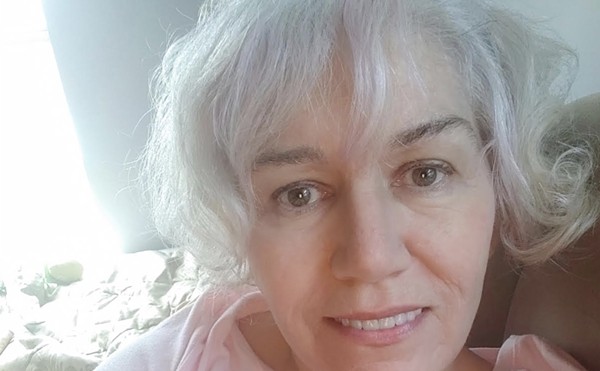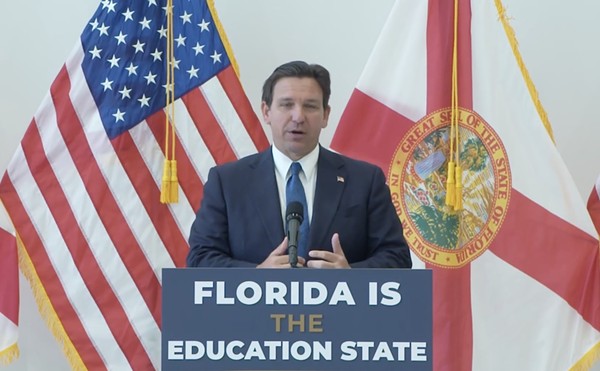Al French wandered into town two years ago, fresh from a pre-medical school excursion to a Caribbean island, still embroiled in a nasty divorce and a million-dollar bankruptcy workout. A friend gave him an office here to, in his words, "play with real estate."
Within a few months French had mysterious out-of-town backers and an ambitious "plan" to redevelop West Church Street into a luxury hotel, mall and entertainment district. City leaders cheered. But as months dragged on and promises grew ripe and dropped off the vine, it became clear -- to everyone except, apparently, City Hall -- that French and his backers were up to something other than what they had claimed to be.
Now some are alleging the whole idea was to rip off the federal government -- that is, the taxpayers -- by making them pay much more than necessary for property on downtown's west side on which to build a federal courthouse.
Let us bring you up to speed:
December 1996: Orlando announces it is selling the Bryan Hotel, a flophouse/general store and low-budget employment agency on the west side formerly owned by the Meiner family. French forms "Carida Partners" with Tom Hager and Ed Neill of North Carolina, and announces a plan for a "suite hotel on the second story with restaurants and shops on the ground floor."
Unreported at the time, French shows Parramore landlord and realtor Phil Cowherd a "business plan" that includes the purchase of a large tract of land in Orlando's downtown black slum. According to a lawsuit filed much later, French asks Cowherd to act as a broker and keep the plans under his hat. (Cowherd denies it.)
January 1997: On the last day bids are accepted, French outbids local landlord/antique dealer Sam Meiner, thrilling city officials. "It's very exciting," says Brenda Robinson, the city's deputy chief administrator. French also buys from Meiner -- for a sum later reported to be $4.9 million -- the Lamar Hotel, which sits on a 3-plus acre lot on Hughey Avenue, right next to the Federal Court building slated for $9.5 million expansion.The Orlando Sentinel publishes a cheery profile of the new development partnership, now called Carolina Florida Property, reporting that it has $150 million in cash.
That money is said to come from Hager, who runs an advertising firm, and Neill, a paving contractor who already had invested $1.7 million in southwest Orange County acreage. City officials favor Carolina Florida's grand plans over those of Meiner, who proposes human-scale redevelopment that would have taken into consideration existing residents.
The Sentinel's reporting establishes the Carolina Florida's reputation for unlimited wealth and bold planning. The partnership's local investment henceforth will be estimated at $20 million to $60 million, and its actions will be judged by its reputation, rather than its reputation being judged by its actions.
June 1997: French reconfirms the company's plans to build an entertainment complex on the site "in the very near future." Establishing a ruse he will hence employ again and again, he promises more details in "60 to 90 days."
French also announces Carolina Florida has purchased the 405-acre Boardwalk and Baseball site from Anheuser Busch, while Neill's previous purchase near Windermere -- now called "Isles of Lake Hancock" -- has 30 houses under construction to be marketed to "recreational water skiiers."
Unreported at the time, French quietly is buying some 25 acres in the Parramore neighborhood, for which his company is paying three-to-five times the acknowledged market value.
August 1997: French proposes reopening the $900,000 Bryan Hotel as a $5-per-night flophouse. "This is by no means a permanent thing. It's part of our civic rent," he says. He also pays the $5,000 back rent owed by Mavis Starke's Cross Roads Mission Homeless Shelter on Parramore Avenue -- a strategic alliance that will allow him to displace poor people from his land without attracting publicity.
October 1997: French proposes demolition of two dozen houses on West Church Street to make way for his partnership's still vaguely-defined development. Former residents will be sent to the Cross Roads; city officials question the need to level the area. "We can't answer their questions because we don't know the answers," French says.
Meanwhile, Cowherd and fellow slumlord Julian Allison together buy nine properties and immediately sell them to French for an aggregate markup of 190 percent.
November 1997: French threatens to build a nine-story hotel and furniture store and cineplex on the site of the old Lamar Hotel, next to the Federal Court building on Hughey Avenue. The federal government wants the land for a new courthouse, but has not been quick enough to make an offer. French had bought the site and demolished the buildings, at a claimed cost of $5 million. Although the "galleria" development is an obvious low-level extortion scheme, The Sentinel reports French's plans credulously. "We can't let that land sit fallow," French says.
Meanwhile, the Boardwalk and Baseball deal has fallen through, but the partnership has spent $10 million buying up dilapidated homes, warehouses, and empty lots on Bryan Avenue, Church Street, South Street, Division Avenue, West Pine and South Hughey on the west side. Prices for the land range upward from $9 per square foot -- several times the assessed value.
January 1998: French files a lawsuit against Cowherd and Allison, claiming the pair conspired against his partnership's interests when -- based upon Cowherd's inside knowledge of French's plan to buy up the neighborhood -- they bought properties themselves that French was obligated to buy from them at prices well above their actual value.
French also backs Daisy Lynum for the open city council seat that represents the west side, pumping several thousand dollars into her campaign. Lynum repays the kindness with now-conventional faith, saying: "I don't think you can go in with $30 million and do anything worse than was there."
February 1998: French announces an alliance with three veterans of Orlando's insular politics: Bob Snow, the formerly shunted aside developer of Church Street Station; Bob Barron, an expert on downtown retail and affordable housing; and Hal Kantor, a real estate zoning law specialist and partner of Lowndes, Drosdick, Doster, Kantor & Reed.
French announces a new plan to let small investors take over the load of his land buys by folding Carolina Florida into a Real Estate Investment Trust (REIT), a tax shelter/pseudo stock offering. Orlando Weekly points out that the REIT market has gone soft and questions why the monied partners would want to reduce their equity stake now, while "our vision" -- French's words -- is, as always, just a month away from announcement.
March 1998: Feds go to court to take control of the 3.8-acre former Lamar lot for the courthouse project. U.S. government, based on its appraisals, offers $3.4 million; French demands $10 million. Federal law requires the government to pay fair market value for the land, based in part on comparable sales in the neighborhood. But in the Parramore area, almost all recent sales have been to French -- and at inflated prices. This just might be significant.
July 1998: Mayor Hood is said to be satisfied with French's latest, still undefined, vision. "I'm very encouraged by what they told me," Hood tells the Sentinel, which continues: "Hood and her top managers have worried for months that the company might hold on to the property and not redevelop it, leaving the city with a slew of boarded-up buildings and empty lots." The buying spree over, the Sentinel reports French has spent "more than $30 million in cash." County tax records show Carolina Florida actually has spent $16.1 million.
Sept. 2, 1998: The Wall Street Journal reports the partnership is imploding, French is leaving and the opulent office is being packed up. Neill, interviewed for the first time, states the obvious: "We could be land banking this for years and years and years." He also claims he was attracted to the Orlando property because of its cheapness relative to similar property in Charlotte -- where NationsBank has cleared slums and removed low-income African Americans. Neill does not explain the discrepancy between the alleged cheapness of Orlando slums and published reports that he had just spent more than $30 million assembling acreage at $10-plus per square foot.
Sept. 3, 1998: Sentinel follows Wall Street Journal story. Makes no mention of Neill's land-banking comment, but for the first time refers to French as a "former flea market operator."
In a court filing two days earlier, Allison alleges French's lawsuit is a ruse to establish higher market values that will drive up the price of French's Lamar site. He cites sloppy legal work -- for example, French improperly served legal papers to Allison at Cowherd's business address, an address that has no connection to Allison -- as evidence that French hopes to sabotage his own lawsuit. Why? Because, says Allison, if French loses -- and the sale price of the Cowherd-Allison properties to him is deemed fair market value -- then French has successfully established a base value that will influence the worth of the land the government wants from him.
Following Allison's logic, taxpayers then would have subsidized an elaborate scam perpetrated by French and his investors, who would bank more than 20 acres on the west side for about $6 million -- that is, the $16 million they've spent minus the $10 million French is demanding for the courthouse property. That puts them in a position to hold onto the remaining land efficiently -- something they could not do if they really had spent $30 million to acquire it.
Now what? Mayor Hood's spokesman, Jim DeSimone, expresses continuing credulity, now seasoned with mild concern. "Don't landbank and burn everything else we're trying to do over there," says DeSimone. Yet with the addition of Kantor to the team, he says things may yet work out: "We do know that they've been reworking their plans to bring them more into conformity. ... We're not shutting Carolina Florida Property off." A meeting was expected (although not yet scheduled) for later this month.

















